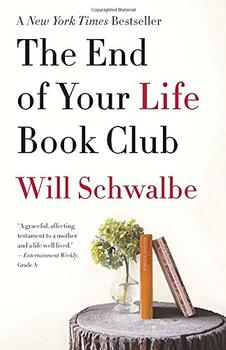Summary | Excerpt | Reading Guide | Discuss | Reviews | Beyond the Book | Readalikes | Genres & Themes | Author Bio

We'd both read several novels by Ian McEwan over the years. McEwan's earlier works feature a catalog of cruelties, including sadism and torture. Mom had spent so much time in war zones, she said, that she was drawn to books that dealt with dark themes, as they helped her understand the world as it is, not as we wish it would be. I'm drawn to books with dark themes mostly because I always feel better about my life in comparison. In his more recent novels, however, McEwan had become less extreme, if not exactly cheery. On Chesil Beach was his latest and had just been published.
In some ways, On Chesil Beach is an odd book to discuss with your seventy-three-year-old mother - given that it involves a just-married couple in 1962 about to have sex for the first time, and describes their disastrously clumsy and messy attempt in vivid detail. That, I didn't mention to her. Instead I talked about the book's fascinating and melancholy coda, which explains what will happen to each of the two main characters. On Chesil Beach had moved me so much that I didn't want to pick up a new book for a while.
"I wonder if things could have turned out differently," I added, after I told her about the couple's fate. The great thing about knowing that my mother always read the ends of books first was that I never had to worry about spoiling them.
"I don't know," Mom answered."Maybe not. But maybe the characters think that things could have turned out differently. Maybe that's why you found it so sad."
We continued talking about the book for a little while, with me still neglecting to mention the pivotal sex scene - not because Mom was prudish but because I have the classic child's horror of having such subjects discussed in the presence of my parents. (I remember vividly the trauma of seeing Peter Shaffer's play Equus with Mom and Dad when I was thirteen. At the point when the boy and girl take off all their clothes and attempt to have sex, I'd wanted to become a pattern on the seat's upholstery.)
Eventually our discussion on that July day returned from my thoughts on the McEwan book to family logistics - who would be where when. Then, at some point, as in most conversations that summer, Mom said that she still couldn't get rid of the hepatitis, that she still wasn't herself, that she didn't have much of an appetite, and that she felt not great. But she was sure, sure, that she would soon feel better, regain her appetite, get stronger. It was only a matter of time. Meanwhile, there was just too much to do - for family, friends, and the libraries to be built in Afghanistan. All needed her attention, and she loved giving it. If only she felt a bit better.
That August the whole family (my brother and his wife; my sister and her partner; me and mine; all five grandchildren) and several friends traveled to Maine to celebrate Dad's eightieth birthday. Mom had organized just about everything and was at almost every event: group breakfasts, a boat trip, and a visit to the Rockefeller Garden in Seal Harbor.
Dad was then, and still is, hardy. He has a full head of hair. Once portly, he's now slimmer than many of his friends. He may puff a little when climbing stairs, and he's by no means what people call a sportsman, but he likes to garden and go on long walks and be outside. He's not fussy - he prefers quirky old restaurants that have seen better days to fancy ones - but he does like a level of comfort. He also likes baroque music and action movies, roadside diners, and having time and leisure to read books on the British Raj. He's completely uninterested in schools and real estate, which were two of Mom's favorite topics, and while he's capable of chatting with great charm about topics that amuse him, he also loves to challenge others when he's decided they're spouting nonsense. He's happiest when it's a little chilly and a bit misty. And he also likes lobsters and a good clambake, as do we all. So Maine was the perfect place to celebrate his birthday.
Excerpted from The End of Your Life Book Club by Will Schwalbe. Copyright © 2012 by Will Schwalbe. Excerpted by permission of Knopf. All rights reserved. No part of this excerpt may be reproduced or reprinted without permission in writing from the publisher.






Children are not the people of tomorrow, but people today.
Click Here to find out who said this, as well as discovering other famous literary quotes!
Your guide toexceptional books
BookBrowse seeks out and recommends the best in contemporary fiction and nonfiction—books that not only engage and entertain but also deepen our understanding of ourselves and the world around us.